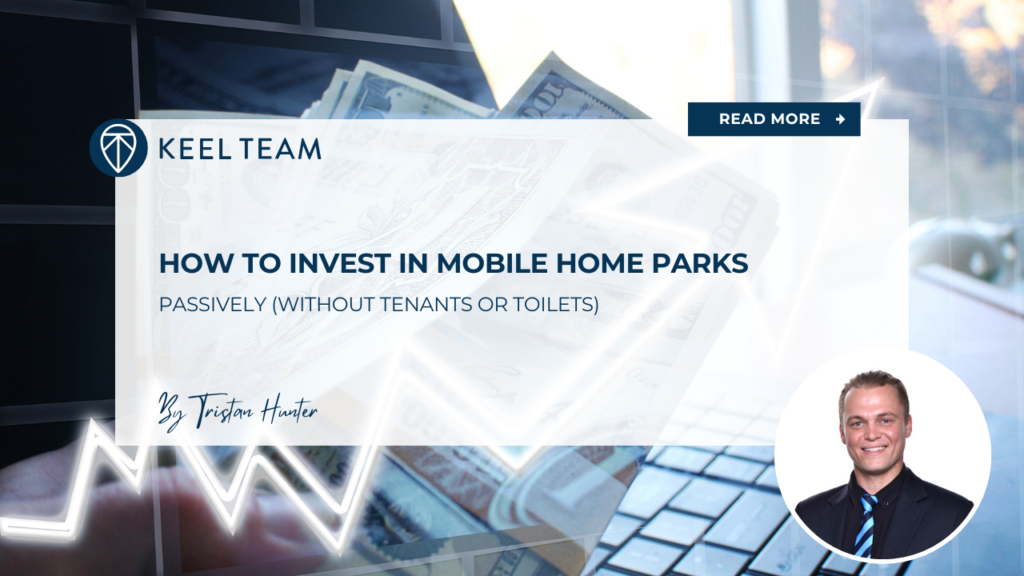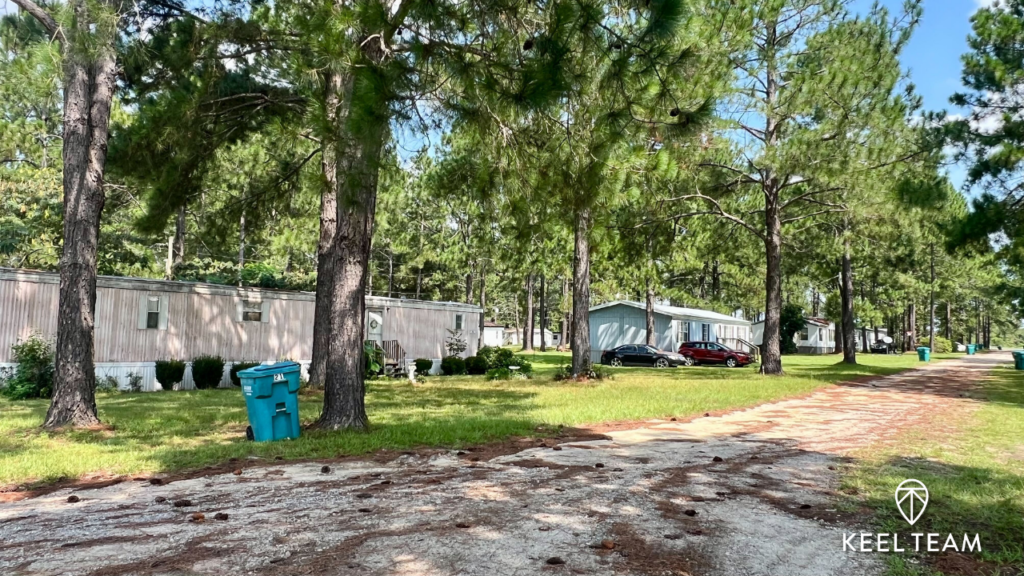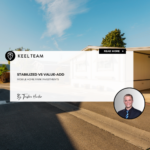How to Invest in Mobile Home Parks Passively (Without Tenants or Toilets)
-
 Tristan Hunter - Investor Relations
Tristan Hunter - Investor Relations

Mobile home park investing offers one of the most stable and recession-resistant real estate opportunities on the market. However, many investors hesitate because they don’t want the hassle of managing tenants, handling maintenance issues, or dealing with operational challenges. Fortunately, passive investing in mobile home parks allows investors to typically benefit from this asset class without hands-on involvement. For those looking to invest in mobile home parks passively, syndications provide an opportunity to earn potential returns while experienced operators handle the day-to-day management.
This guide breaks down how to invest as a limited partner, what to look for in syndications, and the key factors to consider before getting started.
What Is Passive Investing in Mobile Home Parks?
Passive investing means you contribute capital to an investment but do not participate in daily operations. Instead, a general partner (GP) or sponsor manages the mobile home park while you, as a limited partner (LP), receive a share of the potential profits.
This structure allows investors fractional but direct ownership of a mobile home park without dealing with tenant issues, maintenance, or rent collection. The sponsor usually handles everything—acquisition, improvements, rent adjustments, and property management—while LPs earn potential returns through cash flow distributions and appreciation.
Download our FREE eBook on the Top 10 things to know BEFORE investing PASSIVELY in mobile home parks!
Why Invest in Mobile Home Parks Passively?
Mobile home park investing generally provides several advantages for passive investors:
1. Strong Demand for Affordable Housing
Affordable housing remains in high demand, and mobile home parks offer one of the most cost-effective living solutions. With rising home prices and increasing rental rates, demand for mobile home parks could stay strong for years to come.
2. Recession-Resistant Asset Class
Unlike apartments or single-family rentals, mobile home parks tend to perform well during economic downturns. Since moving a mobile home is costly, tenants are more likely to stay long-term, which helps keep occupancy rates stable.
3. Low Turnover and Maintenance Costs
In most mobile home parks, tenants own their homes and only rent the land. This means the operator isn’t responsible for interior maintenance; which can reduce expenses and increase net operating income (NOI).
4. Hands-Off Investment for Limited Partners
Investing in a syndication allows limited partners the potential to collect passive income without dealing with operations. The sponsor handles tenant issues, maintenance, and property improvements while LPs typically receive regular distributions.
How Mobile Home Park Syndications Work
1. The Structure of a Mobile Home Park Syndication
A mobile home park syndication typically involves:
- General Partners (GPs): These are the active investors who find the deal, secure financing, oversee management, and execute the business plan.
- Limited Partners (LPs): Passive investors who provide capital in exchange for a share of the profits. LPs do not participate in daily management.
- The Mobile Home Park Property: The asset purchased using LP funds and any additional financing secured by the GP.
2. How Returns Are Distributed
Passive investors typically earn returns through:
- Cash Flow Distributions: Profits from lot rent collections paid to LPs, usually monthly, quarterly, or annually.
- Property Appreciation: When the mobile home park is improved and later sold for a higher price, LPs receive a share of the possible profits.
- Tax Advantages: Depreciation and other tax benefits may help reduce taxable income.
Most syndications use a preferred return model, meaning LPs receive a set percentage (e.g., 8-10%) of profits before GPs take their share.
What to Look for in a Mobile Home Park Syndication
Not all syndications offer the same potential returns or risk levels. Before investing, consider these key factors:
1. Experience and Track Record of the Sponsor
- Does the sponsor have a history of successful mobile home park investments?
- How many mobile home parks have they acquired and managed?
- Can they provide case studies or references from past investors?
2. Market Selection and Property Location
- Is the mobile home park in a growing or stable market with strong demand for affordable housing?
- What are the vacancy rates and lot rent trends in the area?
- Does the state or county have rent control laws that could impact future income?
3. Business Plan and Value-Add Strategy
- Does the syndication plan include rent increases, utility improvements, or expense reductions?
- Will the operator convert park-owned homes to tenant-owned homes (TOHs) to reduce maintenance costs?
- How will the GP increase NOI and create value over time?
4. Financial Structure and Preferred Returns
- What is the minimum investment required?
- What return projections does the sponsor provide?
- Are there fees (acquisition fees, asset management fees, disposition fees) that impact LP returns?
5. Exit Strategy and Investment Timeline
- What is the expected hold period (5-10 years is common for mobile home park syndications)?
- How does the sponsor plan to exit—refinancing, selling to another investor, or converting to a REIT?
- What happens if the market shifts or a longer hold period is needed?

Potential Risks of Passive Mobile Home Park Investing
While mobile home park investing offers strong potential, investors should be aware of possible risks:
1. Market Fluctuations
Like any real estate asset, mobile home park values depend on market conditions, interest rates, and demand trends. A weak economy could impact returns.
2. Regulation and Rent Control
Some states impose rent control laws that limit how much owners can raise lot rents. Understanding local regulations is crucial before investing.
3. Operator Execution
A syndication’s success depends on how well the general partner manages the mobile home park. Poor execution can lead to lower-than-expected returns.
4. Liquidity Constraints
Mobile home park syndications often require investors to commit capital for 5-10 years. Generally, investors cannot easily sell their shares before the exit strategy is executed, unless provisions are stipulated.
How to Get Started with Passive Mobile Home Park Investing
If you’re ready to explore mobile home park syndications, follow these steps:
1. Research Mobile Home Park Investment Firms
Look for reputable syndication groups with a track record of successful mobile home park investments.
2. Join Investor Networks
Many operators offer webinars, newsletters, and investor events to educate LPs on opportunities.
3. Review Investment Offerings Carefully
Evaluate prospectuses, past performance reports, and financial projections before committing capital.
4. Start with a Small Investment
If you’re new to syndications, consider starting with a lower capital contribution to understand how returns work before making larger commitments.
Final Thoughts on Passive Mobile Home Park Investing
Figuring out how to invest in mobile home parks passively comes down to your preferences. For investors seeking passive income without the headaches of direct ownership, mobile home park syndications offer a promising avenue. The combination of high tenant retention, limited supply, and affordability demand makes it a compelling real estate asset class.
By partnering with experienced operators, passive investors can likely benefit from cash flow, appreciation, and tax advantages without managing tenants, toilets, or trash. While all investments carry risks, those who carefully vet sponsors, markets, and business plans may find mobile home park investing to be a valuable addition to their portfolio.
Good luck and reach out to us if you have any questions!
Are you looking for MORE information? Book a 1-on-1 consultation with Andrew Keel to discuss:
- A mobile home park deal review
- Due diligence questions
- How to raise capital from investors
- Mistakes to avoid, and more!
Disclaimer:
The information provided is for informational purposes only and is not investment advice or a guarantee of any kind. We do not guarantee profitability. Make investment decisions based on your research and consult registered financial and legal professionals. We are not registered financial or legal professionals and do not provide personalized investment recommendations.

Tristan Hunter - Investor Relations
View The Previous or Next Post
Subscribe Below 👇





